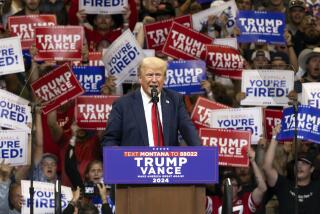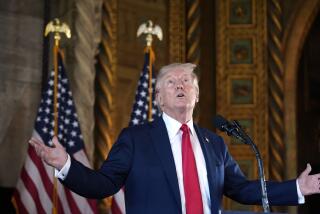Bush Begins His Drive for Reelection
- Share via
WASHINGTON — President Bush filed papers Friday formally declaring his intent to seek a second term, a move that allows him and Vice President Dick Cheney to start raising money and forming a 50-state campaign organization.
While hardly a surprise, the filing kicked into higher gear a 2004 race that most analysts -- as well as Bush’s political strategists -- expect to be close.
Despite Bush’s high job-approval rating -- 69% in the latest Gallup Poll -- “even at this stage it’s impossible to say whether a president will get reelected,” said political analyst and publisher Charlie Cook.
That’s in part because the country remains narrowly divided in allegiance between the two political parties. And the sluggish economy would pose problems for any president -- a political fact of life Bush knows all too well after watching his father lose the White House in 1992 partly because of economic woes.
The younger Bush has stress- ed unendingly his concern about the economy. And he did so again Friday in responding to a question about his reelection:
“The American people will decide whether or not I deserve a second term. In the meantime, I am focusing my attention today on ... helping people find work. And that’s where I’m going to be for a while.”
He also raised the issue on which he rates highest in polls, saying: “We’ve also got a lot of work to do on the security front.”
The White House does not expect Bush to face a serious challenge for his party’s nomination -- a big advantage his father lacked. The elder Bush was first wounded politically when conservative commentator Patrick Buchanan ran against him in the GOP primaries.
Nor does it appear that the younger Bush will have to worry about a third-party candidate such as H. Ross Perot, who focused most of his fire in the 1992 campaign on the elder Bush.
Nevertheless, the Bush-Cheney political team is planning to raise at least $170 million to finance much of its campaigning -- and then rely on federal matching funds in the general election, a senior Republican Party official said.
Bush’s decision to forgo matching funds in the primary -- but not in the general election -- echoes his strategy during the 2000 campaign, in which he raised about $100 million. It allows him to ignore spending limits before he formally accepts his renomination at the Republican National Convention in early September 2004.
White House Press Secretary Ari Fleischer said a Bush-Cheney fund-raising letter would go out “very shortly,” and that a major fund-raiser would be held as early as next month.
Since taking office, the president has lavished time and attention on a handful of states that he narrowly won or lost in 2000. These include Florida, where a disputed recount tipped the election to Bush, and Pennsylvania, which Democrat Al Gore carried.
Despite his travels and the filing with the Federal Election Commission, White House officials said Bush would wait until “substantially down the road” to formally declare his candidacy. Until then, they said, he will focus largely on his day job.
That stance is certain to arouse Democratic skepticism, given Bush’s increasing travels around the country, particularly to key battleground states, to highlight his role as a wartime president who also is paying attention to the economy. Bush’s recent speeches have foreshadowed his likely campaign themes: He inherited an economy that already was faltering and he is the right man to wage the war against terrorism and protect citizens at home.
That Bush heads into his reelection bid with foreign policy as his strongest suit is a remarkable turnaround from 2000, when his bona fides on international affairs were questionable at best.
But almost every issue has a potential downside for Bush, Cook noted.
“There’s a 95% chance that the issue of homeland security will be an asset for him,” he said. But if another terrorist attack strikes America -- especially one seen by the public as having been preventable -- there could be a backlash against Bush, Cook said.
As for the economy, Cook said Bush is likely to be held to account for how it is performing, regardless of how hard he’s tried to improve it.
“I don’t think anybody believes he caused [the downturn], Cook said, “But the danger is, what happens if he’s seen as ineffectual? If people don’t see his economic package as plausible or stimulative, then it raises the question: Does it matter whether he’s in touch or attentive or not?”
Bush will get another chance in two weeks to burnish his foreign policy credentials when he attends the annual summit of industrialized nations -- which includes Germany and France, two nations that staunchly opposed the war against Iraq.
Bush also is expected to pay a visit soon to the Persian Gulf region -- a tour that will highlight his controversial but successful war to oust the regime of Iraqi President Saddam Hussein.
Headquarters for “Bush/Cheney ’04 Inc.” will be in Northern Virginia -- at least symbolically outside of Washington.
White House political director Ken Mehlman will serve as campaign manager, administration officials said. Mercer Reynolds, Bush’s ambassador to Switzerland, will serve as finance chairman; and Jack Oliver, deputy chairman of the Republican National Committee, will serve as the campaign’s deputy finance chairman.
Expected to mastermind the campaign, however, is Karl Rove, the president’s longtime chief strategist and head of the White House’s political operations. Rove will remain on the White House payroll, Fleischer said.
More to Read
Get the L.A. Times Politics newsletter
Deeply reported insights into legislation, politics and policy from Sacramento, Washington and beyond. In your inbox twice per week.
You may occasionally receive promotional content from the Los Angeles Times.










